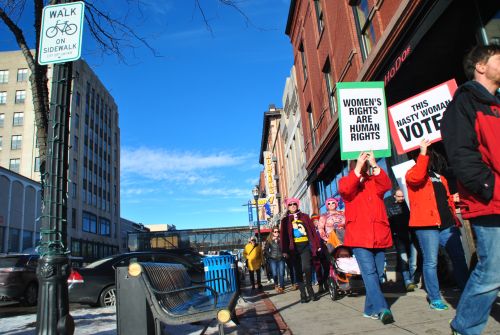News | May 2nd, 2018
 BISMARCK– After Senator Heidi Heitkamp won her race in 2012 against Rick Berg, a primarily Republicans legislature sought to tighten its hold on the state by passing stricter voting identification laws. Their attempts were foiled, however, after a federal ruling struck residential address requirement from the new law.
BISMARCK– After Senator Heidi Heitkamp won her race in 2012 against Rick Berg, a primarily Republicans legislature sought to tighten its hold on the state by passing stricter voting identification laws. Their attempts were foiled, however, after a federal ruling struck residential address requirement from the new law.
The law requires identification to contain a current residential street address, which thousands of minority, Democratic-leaning communities, and rural Indigenous people do not possess.
This week, U.S. District Judge Daniel Hovland blocked an additional motion to reinstate the voter-ID requirement saying attorneys for the state showed no evidence of voter fraud and that “No eligible voter, regardless of their station in life, should be denied the opportunity to vote.”
North Dakota is the only state without voter registration. Republicans defend the bill by saying the lack of stricter measures may allow out-of-state people to vote in North Dakota.
Representative Dan Ruby, a Republican from Minot said the law was not created to stifle votes.
“There was never an attempt to stifle anyone’s vote unless they were not eligible resident voters which the vast majority of the Native Americans are,” Ruby said.
“The only intention of having a physical address is to ensure the person is voting in the jurisdiction where they live. Are the tribes not concerned with someone in Parshall voting on a bond issue in New Town whether it is for a city issue or school board? If they are, how do they limit voters outside the jurisdiction? I live outside the city limits and used to have a Rural Route number. That was changed years ago when 911 addresses were assigned to every home for the purpose of emergency services. Do the reservations not have that? How do they respond to emergencies? How do they make sure someone in Dunseith doesn’t vote in Belcourt? The law protects the integrity of everyone’s vote. It certainly wasn’t intended to suppress votes.”
In 2016, seven members of the Turtle Mountain Band of Chippewa sued Secretary of State Al Jaeger claiming the voter identification law disenfranchised Native Americans.
North Dakota is home to more than 39,669 Native Americans, according to the latest North Dakota Census Office statistics. More than 80 percent of Native Americans who voted in 2012, voted for Heitkamp. Nationally, there are approximately 6.6 million Native Americans, which comprise only two percent of the total population.
Al Jaeger, the current North Dakota Secretary of State, plans to appeal Hovland’s decision in the Eighth Circuit U.S. Court of Appeals, according to media reports.
Gerrymandering and tightening voter-ID laws are attempts by political parties at controlling who shows up at voting booths. Despite the state overwhelmingly voting Republican in recent years, the new voter-ID laws are a paranoid reaction at control, critics said.
“The prospect of losing an election in a state Republicans dominated – they held every statewide office and both legislative chambers – served as a wakeup call,” Alex Rich, communications director for the Democratic-NPL said in a press release. “The North Dakota GOP won’t be able to get away with it this time.”
The lawsuit filed by the Turtle Mountain Band of Chippewa was featured in a news article published by The Nation on Wednesday. Two years after Heitkamp won the U.S. Senate, Native American turnout at the polls declined sharply after the law restricting IDs was passed, the article reported.
“North Dakotans will not stand for their fundamental rights being taken away because of partisan politics,” Representative Joshua Boschee, the Democratic-NPL candidate for Secretary of State, said in a press release.
“Republicans knew exactly the people their voter ID law would disenfranchise, but they went ahead and passed it anyway. We need leadership in the Legislature and the Secretary of State’s office who will work to expand access to the ballot box so our communities can have their voices heard from Bismarck to Washington, D.C.”
Republican Will Gardner, endorsed by the Republican GOP to run for Secretary of State, took up the issue on April 30 in a Facebook video with tribal leaders including Jessica Archambault from Standing Rock and the Director of Indian Affairs Scott Davis.
“We had 16,000 people vote in our state last term that we don’t know who they were or where they were from, and that is a big concern of mine to make sure that first we have integrity in our elections and we know who are voting in our elections,” Gardner said
“We are working together to help the other side of the equation is making sure we are not disenfranchising voters in Indian country, in the tribal nations. We are also trying to make sure how to use the UCC [Uniform Commercial Code] to improve business opportunities in the tribal nations.”
Tom Dickson of Dickson Law Office is an attorney for the Turtle Mountain Band of Chippewa plaintiffs, and also defended Democracy Now! journalist Amy Goodman in 2016 after she faced riot charges while covering the Dakota Access Pipeline controversy.
February 16th 2026
January 27th 2026
January 27th 2026
January 26th 2026
January 24th 2026
_(1)_(1)_(1)_(1)_(1)__293px-wide.jpg)

__293px-wide.jpg)
_(1)_(1)_(1)_(1)_(1)__293px-wide.jpg)

_(1)__293px-wide.jpg)